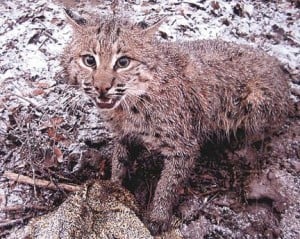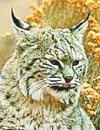BETTENDORF BOBCAT
Bettendorf bobcat sighting no surprise to Iowa DNR
This bobcat was found in 2006 by Davenport's Kenny Burmeister, who thought it was a "big ol' tomcat" when he found it in a coyote snare in northwest Davenport. At the time, Iowa Department of Natural Resources officer Ed Kocal said it was the first he's seen in 14 years on the job. But now it doesn't surprise him: "We have a few bobcats." (QUAD-CITY TIMES FILE PHOTO)
A bobcat sighting in Bettendorf this week does not surprise a local conservation officer with the Iowa Department of Natural Resources.
Ed Kocal, assigned to Scott County by the state DNR, said the report of a bobcat attacking a small dog is "fairly unusual" in a residential area.
"But it doesn't surprise me at all that someone saw one in Bettendorf," he said. "We have a few bobcats."
Paul Bieber, whose home borders Duck Creek near Interstate 74, called the Scott County Humane Society on Tuesday, according to the shelter's executive director, Pam Arndt.
"He said his dog was bitten by a wild cat, though he couldn't say for sure it was a bobcat," she said.
When Bieber described what he saw in a report to the DNR, Kocal said, the animal fit the description of the wild breed that has been making an increasing number of appearances in the area.
In fact, he said, the DNR confirmed a case of bobcat roadkill Saturday a few miles southwest of Blue Grass, Iowa.
In the spring, another Bettendorf resident reported a bobcat sighting, which Kocal also confirmed.
"We also had a case of bobcat roadkill in Bettendorf about three years ago," he said. "That one was a larger male — about as big as they get at 35 pounds."
In this week's attack, Bieber's small dog was let outside about 1 a.m., and he heard the dog's cries a short time later. When he went outside, reports indicate, the dog had several bite wounds, and the owner saw a large cat walking away.
"It's a little strange for a big cat to go after a dog, but it happens," Kocal said. "They've definitely got a food source here —squirrels, rabbits, mice. They're definitely expanding their range. Bobcats usually go after small game and birds and an occasional fawn."
Vince Evelsizer, a DNR biologist, called the attack"unfortunate," adding, "It's not going to start terrorizing the public."
Bobcats are much smaller than cougars, which also have been spotted in Iowa. In 150 years, cougars have killed 19 human beings, according to the DNR. None of the attacks was in Iowa.
Ed Kocal, assigned to Scott County by the state DNR, said the report of a bobcat attacking a small dog is "fairly unusual" in a residential area.
"But it doesn't surprise me at all that someone saw one in Bettendorf," he said. "We have a few bobcats."
Paul Bieber, whose home borders Duck Creek near Interstate 74, called the Scott County Humane Society on Tuesday, according to the shelter's executive director, Pam Arndt.
"He said his dog was bitten by a wild cat, though he couldn't say for sure it was a bobcat," she said.
When Bieber described what he saw in a report to the DNR, Kocal said, the animal fit the description of the wild breed that has been making an increasing number of appearances in the area.
In fact, he said, the DNR confirmed a case of bobcat roadkill Saturday a few miles southwest of Blue Grass, Iowa.
In the spring, another Bettendorf resident reported a bobcat sighting, which Kocal also confirmed.
"We also had a case of bobcat roadkill in Bettendorf about three years ago," he said. "That one was a larger male — about as big as they get at 35 pounds."
In this week's attack, Bieber's small dog was let outside about 1 a.m., and he heard the dog's cries a short time later. When he went outside, reports indicate, the dog had several bite wounds, and the owner saw a large cat walking away.
"It's a little strange for a big cat to go after a dog, but it happens," Kocal said. "They've definitely got a food source here —squirrels, rabbits, mice. They're definitely expanding their range. Bobcats usually go after small game and birds and an occasional fawn."
Vince Evelsizer, a DNR biologist, called the attack"unfortunate," adding, "It's not going to start terrorizing the public."
Bobcats are much smaller than cougars, which also have been spotted in Iowa. In 150 years, cougars have killed 19 human beings, according to the DNR. None of the attacks was in Iowa.












No comments:
Post a Comment